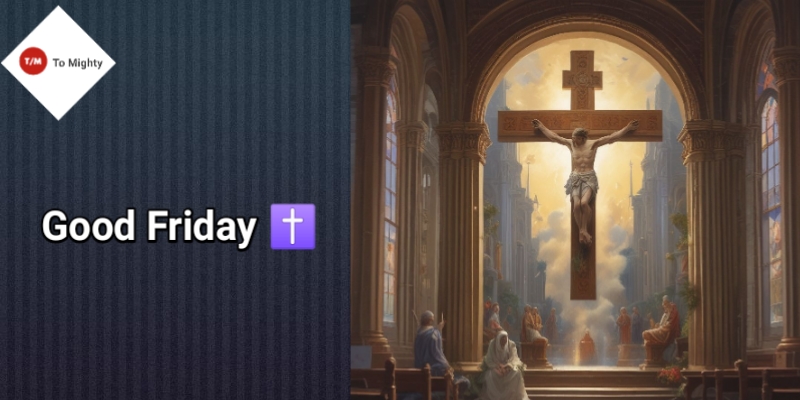Good Friday holds a unique and solemn place in the Christian calendar. Every year, it is observed on the Friday before Easter Sunday, marking the crucifixion of Jesus Christ. While many view it as a day of sorrow, pain, and sacrifice, it is also deeply rooted in reflection, hope, and redemption. The name “Good Friday” might sound contradictory to the painful events of the day, but in Christian belief, it is considered ‘good’ because it led to the resurrection of Jesus and the ultimate victory over sin and death.
Why Is It Called Good Friday?
Despite being a day that commemorates suffering and death, it’s referred to as “Good” because of what it brought to humanity. Christians believe that through Jesus’s death, a new path was opened for people to connect with God. His sacrifice is seen as a symbol of forgiveness and love, which is why the term “Good” reflects the positive outcome of such a painful event. Some scholars also suggest that “Good” might have evolved from the old term “Holy Friday.”
Biblical Significance of Good Friday
According to the Bible, Jesus was betrayed by Judas, arrested, falsely accused, and sentenced to death by crucifixion under Roman law. He was mocked, beaten, and forced to carry His own cross to the site of His execution at Golgotha. The Gospels describe the sky turning dark, the earth shaking, and the temple curtain tearing in two at the moment of His death—signs that something divine had taken place. Christians believe Jesus died to save humanity, making Good Friday one of the most sacred days in Christianity.
How Good Friday Is Observed Across the World
Good Friday is a public holiday in many countries with Christian traditions. People attend church services, many of which are held in silence, candlelight, or dim lighting to create a somber mood. In countries like the Philippines, reenactments of the crucifixion are carried out in the streets, while in parts of Europe, church bells remain silent and altars are left bare to symbolize mourning. Fasting and prayer are common, and many Christians reflect on Jesus’s words from the cross.
The Emotional and Spiritual Reflection on Good Friday
The importance of Good Friday goes beyond just historical or religious observance—it invites individuals to pause and reflect. It’s a moment to consider the meaning of sacrifice, compassion, humility, and forgiveness. The day challenges people to examine their own lives and actions. It’s a powerful reminder that even in moments of darkness, there is hope for renewal. For many believers, this reflection helps renew their faith and draw closer to their spiritual path.
Symbolism Associated with Good Friday
There are many symbols tied to Good Friday. The cross, of course, is the central image, representing suffering but also hope and salvation. The crown of thorns, the nails, and the sign that was placed above Jesus’s head are also powerful visuals used in services and artwork. The color black or dark purple is commonly used in church decorations, symbolizing mourning and repentance. Some churches strip the altar bare on this day, removing flowers and decorations as a mark of respect and grief.
What Not to Do on Good Friday
Good Friday is not a day of celebration or festivity. Traditionally, Christians avoid eating meat, and many fast or eat only a simple meal. Loud music, parties, or other celebrations are generally avoided. The tone of the day is quiet and respectful. For those who are not religious, it’s still a good opportunity to be mindful and considerate of others who hold the day in reverence.
The Role of Good Friday in Modern Society
While the world has become increasingly fast-paced and less connected to religious traditions, Good Friday still serves an important role. It reminds people to slow down and think about deeper values—love, sacrifice, and humanity. Even those who may not identify as Christian often recognize the moral and ethical significance of the day. It opens up space for conversations about forgiveness, empathy, and the nature of suffering.
Why Good Friday Still Matters Today
With everything happening around the world—conflict, inequality, loss, and chaos—Good Friday remains relevant. It reminds people that out of sorrow can come hope, and out of death, there can be new life. It speaks to universal themes that everyone can relate to, regardless of faith. It challenges people to be kinder, more understanding, and more connected to others in pain or in need.
Good Friday and the Message of Peace
One of the most powerful messages of Good Friday is peace. Not just peace with others, but inner peace. In remembering Jesus’s final words, acts, and prayers, people are often moved to forgive, to release burdens, and to find a sense of calm in their hearts. It is not a day of anger or revenge—it is a day that calls for healing and compassion.
What Happens After Good Friday
Good Friday leads into Easter Sunday, the day Christians celebrate the resurrection of Jesus. This connection between the pain of crucifixion and the joy of resurrection reflects the cycle of life, death, and hope. It shows that even the darkest moments have light on the other side. This transition from sorrow to joy gives Good Friday even deeper meaning in the Christian faith and emphasizes the power of patience, faith, and love.
Bottom Line
Good Friday may be somber, but it carries a message that continues to inspire billions. It’s a reminder that pain is not the end of the story, and that love and sacrifice can bring about profound change. In the quiet of this sacred day, there is a deep message waiting for all of us—one that calls for compassion, humility, and hope.
Keep reading powerful stories like this on To Mighty and stay connected with the moments that matter.
Sheikh Faraz is a talented writer with years of experience in creating content on a variety of topics. From cricket and beauty to fashion, education, and general knowledge, he has a knack for turning complex ideas into simple, easy-to-understand articles. His writing is clear, relatable, and always focused on providing value to his readers.
With a strong passion for storytelling, Sheikh Faraz takes pride in delivering well-researched and engaging content. Whether it’s breaking down the latest cricket match, sharing practical beauty tips, or exploring new fashion trends, his work reflects his dedication to quality and authenticity.


